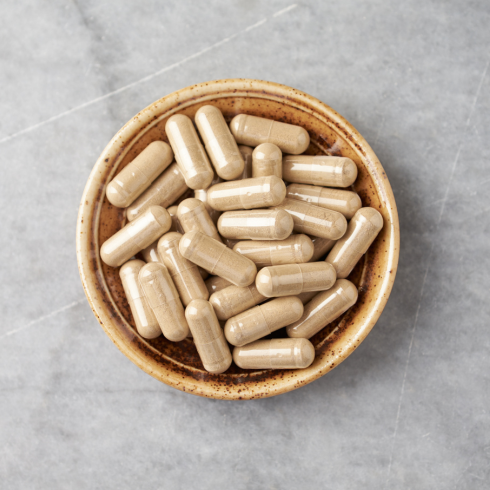Ashwagandha: Your Essential Guide to Reducing Stress & Anxiety
TABLE OF CONTENTS
WHAT IS ASHWAGANDHA?
Ashwagandha, scientifically known as Withania somnifera, is a medicinal plant native to India, used for over 3,000 years in Ayurvedic medicine. It is also known as Indian ginseng or winter cherry, although it does not belong to the same botanical family as Asian ginseng. Its Sanskrit name literally means “smell of horse,” referring both to the strong scent of its root and its reputation for enhancing energy and vitality.
An adaptogenic plant
Ashwagandha is classified as an adaptogen. This means it naturally helps the body adapt to different types of stress — physical, emotional, or environmental. Unlike a typical stimulant, an adaptogenic plant does not “force” the body to respond: it supports its ability to restore balance, also called homeostasis.
Origin and cultivation
Native to India, the Middle East, and some regions of Africa, Ashwagandha mainly grows in hot and dry climates. Its roots are used for medicinal purposes, and sometimes its leaves as well. Today, it is cultivated on a large scale to meet growing global demand, particularly in the areas of stress management, sleep, mental performance, and overall well-being.
A support for the nervous and hormonal system
What makes Ashwagandha particularly interesting is its ability to modulate cortisol levels, the stress hormone.
It also acts on other hormonal and neurotransmitter pathways, which explains its beneficial effects on anxiety, nervous fatigue, sleep, and even concentration.
TYPES OF ASHWAGANDHA & AVAILABLE FORMATS.
Understanding the differences to make an informed choice
Ashwagandha is now available in several forms and types of extracts, each with specific characteristics in terms of concentration, effectiveness, and method of use. To fully benefit from its effects, it is essential to distinguish between the different options available on the market.
Whole root or standardized extract: what’s the difference?
Dried whole root
Derived from the plant in its most natural state, the whole root is simply dried and ground. It contains all the compounds naturally present in Ashwagandha, in unmodified proportions. Its action is often more gradual and holistic, in line with Ayurvedic tradition.
This form is valued for its holistic approach, but may require prolonged use before noticeable effects appear.
Standardized extract
This is a concentrated form in which certain active compounds are isolated and measured, particularly withanolides – molecules recognized for their adaptogenic properties. These extracts are often standardized to a precise percentage (for example, 5%), allowing more targeted dosing and consistent effects.
The standardized extract is often used in clinical studies, especially in the context of stress, anxiety, or sleep management.
Common formats on the market
Powder
Ashwagandha powder, usually obtained from the root, can be added to hot drinks, smoothies, or culinary preparations. It often retains a strong taste and specific texture.
Recommended for those seeking a minimally processed and customizable product.
Capsules or softgels
These convenient formats contain either powder or a standardized extract. They provide a simple, discreet, and tasteless option with clear and reproducible dosing.
Ideal for people who want to easily integrate Ashwagandha into their daily routine.
Liquid extract
This form, also called a tincture, offers rapid absorption by the body. It suits those looking for efficient assimilation or who prefer to avoid solid forms.
Useful for occasional needs or when rapid effects are desired.
Chewable gummies
More recent on the market, gummies often combine convenience with a pleasant taste. However, they are generally less concentrated in active compounds and should be carefully selected based on their composition.
Suitable for people who have difficulty swallowing capsules, but should be chosen carefully depending on product quality.
Summary of selection criteria.
| Main goal | Recommended form |
|---|---|
| Fast and targeted action | Standardized extract in capsules or liquid |
| Traditional and holistic approach | Whole root powder |
| Ease of daily use | Capsules or softgels |
| Pleasant taste, occasional use | Chewable gummies (well formulated) |
HOW TO CHOOSE YOUR ASHWAGANDHA.
Essential criteria for an effective purchase tailored to your needs
Not all forms of Ashwagandha are equal. To fully benefit from its properties, it’s important to select a product that not only matches your personal goals but also meets the expected quality standards for a serious supplement. Here are the key points to consider before making your choice.
1. Clearly define your goals
Before choosing a product, it is essential to identify the desired effect:
- Stress or anxiety reduction: choose a standardized extract containing a precise percentage of withanolides (generally 5%) for proven effectiveness.
- Sleep support: opting for a formula that includes other calming plants (such as lemon balm or valerian) in synergy can enhance the effects.
- Energy and recovery improvement: whole root powders can be integrated into a broader nutritional routine, especially for active individuals.
- General mental well-being support: regular low-dose intake is often enough, in the form of capsules or liquid, as maintenance.
2. Check the quality of the extract
Several criteria help assess the quality of an Ashwagandha supplement:
- Withanolide standardization: quality extracts clearly state the concentration of these active compounds (often between 2.5% and 10%). This information is crucial, as it reflects the potency of the product.
- Part of the plant used: a product formulated exclusively from the root is preferable, as this part is the most studied and richest in active compounds.
- Gentle extraction method: techniques using only water or alcohol are generally better tolerated and preserve active compounds.
3. Choose reliable certifications
To ensure safety, traceability, and the absence of contaminants, look for the following certifications:
- Organic certification (AB, USDA Organic, etc.): ensures cultivation without pesticides or chemical fertilizers.
- Quality certifications (ISO, GMP): indicate compliance with good manufacturing practices and strict quality control.
- Independent lab testing: a product tested for purity, and the absence of heavy metals or residues, is a mark of reliability.
- “Vegan” or “additive-free” label: useful for those with specific diets or intolerances.
The 5 questions to ask yourself before buying
- What is my main goal (stress, sleep, energy, etc.)?
- Does the product state the percentage of withanolides?
- Is it made only from the root, without leaf parts?
- Is it certified organic or quality-tested?
- Does the consumption method suit me (capsule, powder, liquid)?
A good Ashwagandha supplement is one that combines proven effectiveness, transparency about its composition, and compliance with quality standards. Taking the time to compare labels and sources will allow you to choose a product truly suited to your needs.
KEY BENEFITS OF ASHWAGANDHA.
Recognized effects on stress, anxiety, sleep, and cognitive functions
Ashwagandha, the adaptogenic plant par excellence, acts on several levels simultaneously. Its overall action on the body makes it a valuable ally for people seeking mental and physical well-being. Here are the most frequently reported and studied benefits.
1. Reduction of chronic stress
One of the most documented effects of Ashwagandha is its ability to lower cortisol levels, the stress hormone. This hormonal regulation helps better manage daily pressures without causing drowsiness or fatigue.
Result: greater emotional stability, improved mental resilience, and a more lasting sense of calm.
2. Reduction of anxiety
Ashwagandha has demonstrated in several clinical trials its ability to relieve symptoms of mild to moderate anxiety, mainly due to its action on GABA receptors, a key neurotransmitter in regulating the central nervous system.
It is often well tolerated when used alongside psychological support or a lifestyle focused on serenity (sleep, diet, physical activity).
3. Improved sleep quality
Although not a sleeping pill, Ashwagandha promotes deeper, more restorative sleep, particularly in people whose sleep disorders are linked to excess stress or underlying anxiety.
It helps with falling asleep, reduces nighttime awakenings, and supports a refreshed feeling upon waking, without the “hangover” effect associated with some medications.
4. Support for cognitive functions
Ashwagandha may also help improve focus, working memory, and mental clarity, by reducing the “brain fog” often linked to stress or mental fatigue.
Its neuroprotective effect, highlighted in some research, makes it an interesting supplement for active individuals, students, or anyone going through a period of intellectual overload.
As a complement to a balanced lifestyle.
Ashwagandha does not replace healthy eating, sufficient sleep, or regular physical activity. However, it can serve as an effective natural tool to restore a more stable mental, emotional, and physical balance.
HOW ASHWAGANDHA REDUCES STRESS AND ANXIETY.
A multiple and targeted action to restore nervous and hormonal balance
Ashwagandha is one of the most studied adaptogens for its effects on stress and anxiety. Unlike medications that often act in a punctual or symptomatic way, this plant offers a holistic approach by acting on several fundamental mechanisms of chronic stress. Here’s how it works.
1. Natural regulation of cortisol
Cortisol, nicknamed the “stress hormone,” is secreted by the adrenal glands in response to physical or psychological stress. While essential in the short term, excessively high cortisol levels over long periods can lead to anxiety, sleep disorders, abdominal weight gain, and even chronic fatigue.
Clinical studies have shown that taking Ashwagandha, particularly in standardized extract form, helps significantly reduce cortisol levels in people exposed to continuous stress. This hormonal decrease is often accompanied by improved overall well-being and a sense of calm felt within the first few weeks of supplementation.
2. Support for the central nervous system
Ashwagandha also acts on brain neurochemistry, positively influencing several neurotransmitters involved in managing anxiety:
- Serotonin: associated with mood, motivation, and inner security.
- GABA (gamma-aminobutyric acid): the brain’s main inhibitory neurotransmitter, responsible for calming nervous excitability.
Thanks to this action, Ashwagandha promotes a sense of calm without causing excessive drowsiness, setting it apart from traditional sedatives. It can therefore help reduce mental restlessness, improve focus, and stabilize mood.
3. Strengthening stress resilience
One of the key roles of an adaptogen is to support the body’s defense mechanisms against stressors. Ashwagandha does this by acting on the HPA axis (hypothalamic-pituitary-adrenal axis), the central regulator of hormonal responses to stress.
This action allows the body to better tolerate stressful situations and recover more quickly after intense physical or emotional effort. In daily life, this translates into reduced reactivity to stress, a faster return to calm after setbacks, and greater emotional stability.
In summary, Ashwagandha does not merely mask the symptoms of stress. It works deeply, acting on hormones, the nervous system, and the body’s adaptive capacity. This makes it a valuable ally in a natural approach to managing stress and anxiety.
OPTIMAL USE OF ASHWAGANDHA.
Practical tips to fully benefit from its effects
To take advantage of Ashwagandha’s benefits on stress, anxiety, or mental fatigue, it’s important to know how to use it correctly. The plant is generally well tolerated, but like any supplement, thoughtful and tailored use is essential. Here are the key recommendations to know.
When should you take it?
The best time of day depends on your main goal:
- To reduce daily stress or background anxiety: taking it in the morning or at noon can support emotional balance throughout the day.
- To promote sleep or ease evening tension: taking it in the evening or about an hour before bedtime is preferable.
- To improve recovery or focus: intake can be split into two times (morning and evening), depending on tolerance and personal response.
Ashwagandha is not a stimulant. It can act gently while helping you stay focused or relaxed depending on your needs.
How should you take it?
The form you choose influences how it is consumed:
- Powder: mix into warm water, plant-based milk, or a smoothie. It can also be added to recipes (teas, porridges).
- Capsules or tablets: simple intake with a glass of water, often recommended for regular use.
- Liquid extract: a few drops diluted in a beverage, depending on the product’s concentration.
It is recommended to take Ashwagandha with a meal or light snack to optimize absorption and avoid potential digestive discomfort.
What dosage is considered safe and effective?
The dosage depends on the form used, but clinical studies have identified effective and well-tolerated ranges:
- Standardized extract (5% withanolides): between 250 mg and 600 mg per day, in one or two doses.
- Whole root powder: generally between 3 g and 6 g per day, depending on individual tolerance.
- Liquid extract: follow the specific dosage indicated by the manufacturer, as concentration can vary significantly between brands.
Precautions to follow
- Always respect the dosage indicated on the label, especially for concentrated extracts.
- Avoid use during pregnancy, breastfeeding, or hormonal treatments unless medically advised.
- If taking anxiolytics or antidepressants, medical advice is strongly recommended to avoid interactions.
Key takeaway: Ashwagandha works gradually. It is therefore recommended to follow a course of at least 4 to 6 weeks to fully observe its effects, while staying attentive to your body.
MYTHS VS. REALITY.
Sorting fact from fiction about Ashwagandha
The growing interest in adaptogenic plants has led to a multiplication of statements about Ashwagandha, sometimes contradictory or exaggerated. To make an informed choice, it is essential to distinguish misconceptions from scientifically established facts. Here’s an overview of the main beliefs to reconsider.
Myth 1: Ashwagandha works immediately
Reality:
Ashwagandha is not an instant remedy. Its action is progressive and generally requires several days, or even a few weeks, to fully manifest. It works deeply on hormonal and nervous systems, which requires some adaptation time for the body. The most serious studies show noticeable effects between the 2nd and 6th week of regular intake.
Myth 2: It’s only for stressed people
Reality:
While Ashwagandha is particularly valued for stress management, its benefits go beyond that. It can also support sleep quality, boost mental endurance, improve concentration, aid physical recovery, and strengthen the immune system. It is a versatile plant suitable for various profiles, not only for those dealing with chronic stress.
Myth 3: The higher the dose, the stronger the effect
Reality:
A higher dose does not guarantee better results and may even cause side effects (digestive issues, drowsiness, low blood pressure). The effectiveness of Ashwagandha depends mainly on the quality of the extract (especially its withanolide content) and the consistency of intake, rather than the sheer amount consumed.
Myth 4: All Ashwagandha products are the same
Reality:
There are major differences among products on the market. Some contain only raw powder, while others are standardized extracts with very precise concentrations. In addition, cultivation quality, extraction method, traceability, and certifications play a fundamental role in product effectiveness. Checking these factors is crucial to avoid ending up with an ineffective or poorly formulated product.
Myth 5: It has no side effects at all
Reality:
Ashwagandha is generally well tolerated, but it can cause side effects in sensitive individuals or at high doses: drowsiness, digestive discomfort, or potential interactions with medications. It remains an active plant that should be used wisely and in compliance with recommendations.
Ashwagandha is a promising plant, but it is neither magical nor miraculous. Its real effects are supported by solid scientific evidence, provided that you choose a quality product, respect the proper dosage, and integrate it into an overall wellness approach.
HOW TO USE ASHWAGANDHA?
Forms, dosage, and usage tips for optimal effectiveness
Ashwagandha’s effects largely depend on the form chosen, the method of consumption, and the dosage suited to your personal situation. Here’s a guide to safely integrating this supplement and getting the most out of it.
Main forms available
1. Root powder
Powder is one of the closest forms to the raw plant. It is obtained by grinding the dried root. Its taste is naturally bitter and earthy, but it can easily be mixed with:
– smoothies
– plant-based drinks (almond milk, oat milk, etc.)
– teas or porridges
This form is often preferred in Ayurvedic practices or by those seeking the most natural consumption possible.
2. Capsules or tablets
This is the most common format, practical and easy to incorporate into daily life. Capsules contain either root powder or a concentrated standardized extract.
This format allows precise and consistent dosing, without taste or preparation.
3. Liquid extract (tincture)
This form comes as drops to be diluted in a little water or placed under the tongue, according to the manufacturer’s recommendations. It is generally well absorbed by the body and can be suitable for those who have difficulty swallowing tablets.
It offers rapid assimilation, with effects often felt faster than other forms.
Recommended dosage: what do studies say?
Dosage varies depending on the product’s concentration and your goal. Clinical research mainly relies on standardized extracts of withanolides, Ashwagandha’s main active compounds.
– Standardized extract at 5% withanolides: between 250 mg and 600 mg per day, in one or two doses.
– Whole root powder: generally between 3 g and 6 g per day, split into several doses depending on tolerance.
It is always recommended to start with the lowest dose (for example 250 mg), especially if you are new to it or if you are taking other supplements or medications.
Usage tips
- Take Ashwagandha with a meal or light snack for better digestion and absorption.
- Be consistent: the plant works over the long term. Daily use for several weeks is often necessary to fully feel the benefits.
- Follow the manufacturer’s instructions, especially if you are using a product combined with other plants or active substances.
Ashwagandha is a supplement to be integrated gradually, respecting your pace and personal sensitivity. A measured approach helps avoid side effects and ensures its benefits are established in a lasting way.
SIDE EFFECTS AND PRECAUTIONS.
What to know before starting Ashwagandha supplementation
Ashwagandha has a good tolerance profile for most users. However, like any natural active compound, it is not free from contraindications or interaction risks. Thoughtful use, adapted to individual circumstances, allows you to benefit safely.
A generally well-tolerated plant
In most clinical studies, Ashwagandha has shown excellent tolerance, even with long-term use. It does not cause dependence or addiction, which sets it apart from anxiolytic or sedative medications. This makes it suitable for regular use, provided recommended doses are respected.
Possible side effects
Although rare and usually mild, some side effects have been reported in a minority of users, especially at the beginning or with excessive doses:
- Drowsiness or temporary fatigue, especially if taken during the day or combined with other relaxing plants.
- Mild digestive issues, such as bloating, nausea, or abdominal discomfort, more frequent with raw powders or highly concentrated extracts.
- Moderate drop in blood pressure in sensitive individuals or those prone to hypotension.
These effects generally disappear after stopping use or adjusting the dose.
Important precautions to follow
Certain medical situations require particular caution, or prior advice from a healthcare professional:
- Pregnancy and breastfeeding: Ashwagandha is not recommended due to insufficient clinical data on safety in these contexts.
- Thyroid disorders: the plant may influence thyroid hormone levels. Medical monitoring is advised for people with hyperthyroidism or hypothyroidism.
- Psychotropic treatments: due to its calming effects, Ashwagandha may interact with certain anxiolytics, antidepressants, or sleeping pills. Medical consultation is essential if you are undergoing treatment.
Best practices for safe use
- Always start with the minimum recommended dose, especially in cases of digestive sensitivity or when combining with other supplements.
- Choose a certified quality product, with clear traceability and controlled dosage.
- Pay attention to how your body reacts during the first few weeks, adjusting intake time or form if necessary.
In summary, Ashwagandha is a natural and well-tolerated solution, but it should be used wisely. Responsible use, based on best practices and, if necessary, medical guidance, ensures a positive and lasting experience.
WHO IS IT USEFUL FOR?
A supplement suited to different profiles and lifestyles
Ashwagandha is not reserved for a specific category of people. Because of its overall action on stress, nervous balance, and the body’s adaptability, it can be useful for many profiles. Its usefulness mainly depends on personal context and individual needs. Here are situations where its use may be particularly relevant.
1. People under chronic stress
Whether the stress is professional, family-related, or linked to life changes, Ashwagandha can play a role as a hormonal and emotional regulator. It helps temper excessive stress responses, reduce irritability, and support a return to balance. Its action on cortisol specifically helps limit the physical effects of prolonged stress (fatigue, disturbed sleep, muscle tension…).
2. Anxious profiles seeking natural alternatives
People dealing with mild to moderate anxiety may find in Ashwagandha a natural, non-sedative solution to stabilize mood and ease mental agitation. Without causing heavy side effects like some pharmaceutical treatments, it gently acts on stress circuits with good long-term tolerance.
3. Athletes facing overtraining or nervous fatigue
Repeated physical effort, intense training, or competitions can create significant stress on the body. Ashwagandha supports physical and mental recovery by reducing nervous fatigue and limiting muscle breakdown caused by cortisol. Some athletes also use it to improve resilience to effort and preserve hormonal balance.
4. Busy professionals under mental or emotional overload
Executives, students, entrepreneurs, healthcare workers: all profiles facing high cognitive or emotional demands can benefit from Ashwagandha’s stabilizing effects. It helps maintain focus, calm the mind, and better handle pressure without reducing intellectual abilities or causing energy drops.
A versatile support during demanding periods
Beyond these profiles, Ashwagandha can also be integrated during transitional periods (new job, recovery after burnout, convalescence, grief) or during projects requiring mental endurance, adaptability, and emotional stability.
COACH'S TIPS

If Ashwagandha can help you feel calmer, more relaxed, and less stressed, remember that a proper diet is still the foundation. Supplementation with vitamins and minerals can also be an asset. Likewise, if you are an athlete, protein powders can help your muscles grow or maintain themselves.
Related posts
-
 Summer holidays: How to limit the damage?
Posted in: Our tips24/06/2021On holiday, we often tend to let ourselves go. Unless you're a hardcore sportsman, you tend to abandon your trainers...Read more
Summer holidays: How to limit the damage?
Posted in: Our tips24/06/2021On holiday, we often tend to let ourselves go. Unless you're a hardcore sportsman, you tend to abandon your trainers...Read more -
 Which fat burner to choose?
Posted in: Our tips26/05/2021To lose weight and burn fat, there is no secret: you have to do sport and take care of your diet. However, it is...Read more
Which fat burner to choose?
Posted in: Our tips26/05/2021To lose weight and burn fat, there is no secret: you have to do sport and take care of your diet. However, it is...Read more -
 Summer body edition for men: How to prepare your body?
Posted in: Our tips11/05/2021Gentlemen ? The return of the sun and its warm rays are almost here! The degrees are slowly but surely rising, but...Read more
Summer body edition for men: How to prepare your body?
Posted in: Our tips11/05/2021Gentlemen ? The return of the sun and its warm rays are almost here! The degrees are slowly but surely rising, but...Read more -
 9 good reasons to do sport.
Posted in: Our tips22/04/2021Sometimes the urge to exercise is not always there. And although we always tell ourselves that this year will finally...Read more
9 good reasons to do sport.
Posted in: Our tips22/04/2021Sometimes the urge to exercise is not always there. And although we always tell ourselves that this year will finally...Read more -
 Discover how to take care of your faithful companion: your shaker!
Posted in: Our tips07/04/2021In your bag, in your hand, in your sink, it is everywhere! The shaker is an essential element of any good training....Read more
Discover how to take care of your faithful companion: your shaker!
Posted in: Our tips07/04/2021In your bag, in your hand, in your sink, it is everywhere! The shaker is an essential element of any good training....Read more
Blog categories
Popular posts
-
 Looking thinner but at a heavier weight? Is that possible?04/10/2021Posted in: Our tipsAdvertising has shaped our thinking! We have been forced for years to believe that losing weight is the key to having...Read more
Looking thinner but at a heavier weight? Is that possible?04/10/2021Posted in: Our tipsAdvertising has shaped our thinking! We have been forced for years to believe that losing weight is the key to having...Read more -
 10 Expert Tips to Maximize the Effectiveness of Creatine26/08/2024Posted in: Our tipsThis article presents ten tips to maximize the effectiveness of creatine. It emphasizes the importance of choosing...Read more
10 Expert Tips to Maximize the Effectiveness of Creatine26/08/2024Posted in: Our tipsThis article presents ten tips to maximize the effectiveness of creatine. It emphasizes the importance of choosing...Read more -
 10 BENEFITS OF GLUTAMINE.02/01/2024Posted in: Our tipsDiscover the power of L-glutamine, an underrated superhero in the world of amino acids! Essential for revitalizing...Read more
10 BENEFITS OF GLUTAMINE.02/01/2024Posted in: Our tipsDiscover the power of L-glutamine, an underrated superhero in the world of amino acids! Essential for revitalizing...Read more -
 Proteins for weight loss !29/12/2023Posted in: Our tipsDive into the fascinating world of proteins and their key role in weight loss. Discover how to choose the best...Read more
Proteins for weight loss !29/12/2023Posted in: Our tipsDive into the fascinating world of proteins and their key role in weight loss. Discover how to choose the best...Read more -
 The advantages and disadvantages of sports and competitive sports.28/08/2024Posted in: Our tipsExplore ways to prevent the demanding aspects of competitive sports by adopting preventive and management practices....Read more
The advantages and disadvantages of sports and competitive sports.28/08/2024Posted in: Our tipsExplore ways to prevent the demanding aspects of competitive sports by adopting preventive and management practices....Read more

.jpg)

